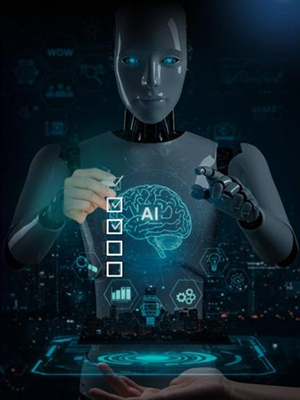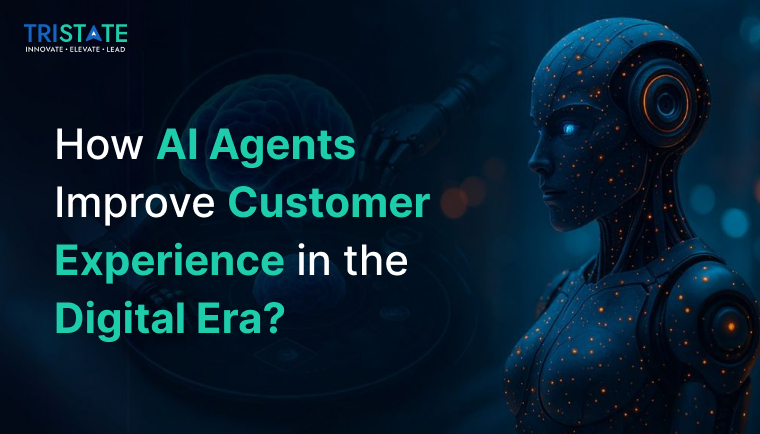
Every company that interacts with customers be it ecommerce, fintech, travel, and hospitality understands this: the online world moves quickly. What customers expect today, they may not expect tomorrow. This is why AI agents customer experience has risen to prominence.
Businesses are now using AI throughout the customer support experience to delight customers, speed up responses, lower costs, and gain a competitive advantage.
In this post, we are going to walk you through what AI powered customer experience really means in 2025. We will lay out how AI agents can fundamentally change customer support, what features are meaningful, how to start implementing, and what pitfalls to avoid.
If you are a CX Manager, Head of Operations, Marketer, or Business Owner hoping to gain practical advice, this will give you some insight, and things to try in your own business.
Table of Contents
Why AI Agents Matter for Improving Customer Experience Today
- Increasing Customer Expectations: Almost everyone expects quick and personalized service. Zendesk shows that nearly 50% of customers feel that an AI agent can demonstrate empathy in responding to their concerns.
- 24/7 Expectations: Customers do not wait; instead they want answers when they want them, even if it’s midnight on a Sunday. AI agents and a customer support automation process allow you to add coverage during off-hours without overworking your agents.
- Cost Strain + Efficiency: Businesses are expected to become more efficient while also lowering costs and scaling. AI can automate tasks that customer service agents do regularly. One recent report indicates that conversational AI will decrease contact center labor costs by $80 billion by 2026.
- Personalization + Insights: With the use of AI analytics, NLP, and sentiment analysis, companies can identify behavior, mood and preferences. When AI listens, it shifts customer support to proactive, and not just reactive.
Different Types of AI Agents in Customer Service
| Type of AI Agent | How It Really Helps in Customer Service |
| Chatbots & Virtual Assistants | The casual “first hello” on websites, apps, or WhatsApp. It handles frequently asked questions, tracks orders, books tickets and troubleshoot quick little issues around the clock. |
| Voice Bots & IVR Systems | The ones you hear on phone calls, where instead of hearing “press 1 press 2” repeatedly, are now much more intelligent, conversational, and can recognize your voice, address simple inquiries, and very smoothly switch to a human being when necessary. |
| Agent-Assist Tools | Then are sidekicks to human agents. They will suggest a “quick reply,” or immediately retrieve customer history, and even flag if a caller sounds upset, and then help the human agent respond effectively. |
| Autonomous AI Agents (Agentic AI) | Then there are these copilot vehicles that do not just chat. They can complete an entire transaction, think process a refund or change account credentials, without a human needing to jump in. |
| Analytics & Sentiment Agents | Finally, there are the “behind the scenes” listeners. These bots take a variety of cues from chat, email, or phone calls and observe trends and moods. If lots of customers are getting upset about something, those bots will try to raise their little red flags early. |
The Advantages of AI Agents in Customer Service
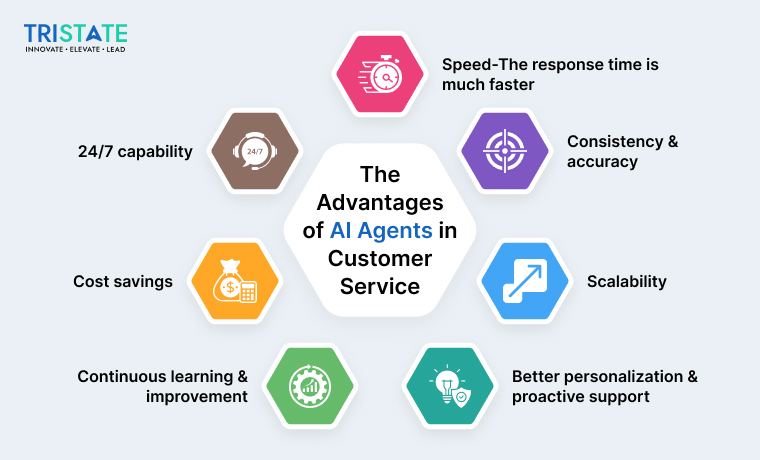
Let’s take a look at the real advantages of AI agents:
1. Speed-The Response Time is much Faster
No one likes waiting. AI agents can instantaneously respond to nearly any customer inquiry, so no more longer hold times or response times.
2. Consistency & Accuracy
AI agents can respond to inquiries/requests the same way every time, enabling repeatability and limiting errors while providing clear and correct answers.
3. Scalability
When you’re busy, AI agents can easily manage multiple chats, or phone calls, or handle multiple requests without added stress or additional employees.
4. Cost Savings
By automating transactional and repeated tasks, AI allows human agents to manage complex issues. This will improve efficiency of the operation and allow processes to run smoother.
5. Better Personalization & Proactive Support
AI agents can follow-up on past interactions and predict customer needs and solutions, and even proactively reach out before an issue is identified.
6. 24/7 capability
There are no business hours, and no downtime; AI is on call day or night, even if it’s the weekend.
7. Continuous Learning & Improvement
Every interaction is a learning opportunity. AI reviews conversations to identify patterns, learn in real-time, improve responses, and improve the overall experience over time.
Essential Features of AI Agents for Level of Service Gold Standard
| Strong NLP & Intent Detection | To recognize what they mean by the customer’s ‘true’ issue added to keywords. |
| Sentiment Analysis / Emotional Intelligence | To identify frustration, urgency, and respond accordingly. |
| Context Awareness & Memory | So the agent recalls previous interactions, profile, and preferences. |
| Omni-channel Capability | Chat, voice, email, social- customers switch between them. |
| Escalation to Human Agents | Some issues are the responsibility of a person. Consider the transfer. |
| Proactive Capabilities | If you can identify a potential issue upfront (delayed shipment, product issues), connect and address. |
| Security & Data Privacy | Need to be conscientious about the customer’s data. Compliance matters. |
| Easy Integration | CRM systems, ERP, backend tools, knowledge base- all need to integrate and collaborate. |
| Monitoring & Analytics Dashboards | To obtain metrics for CSAT, resolution time, handle time, cost, etc. |
Use Cases for AI Agents in Customer Service
Here is a fictitious list of job function situations. Some you already experience. Others you might plan for- or have a use case you did not know existed.
- e-Commerce: AI agents can address order status, returns, and product inquiries.
- Travel and Hospitality: AI can handle booking changes, cancellations, and personalization info (room upgrades, preferences).
- Fintech/Banking: Fintech AI can assist with information for transactions, fraud alerts, and account setup tasks.
- Retail: Store locators, inventory status, and rewards management.
- Social Media: AI agents monitor brand mentions or follow up with people when changes are made to a review.
- Call Center: AI Agents, while a human is on the call, AI provides suggested options from transcripts, sentiment detection, and auto suggestions.
Step-by-Step Guide to Deploying AI Agents for Seamless Customer Support
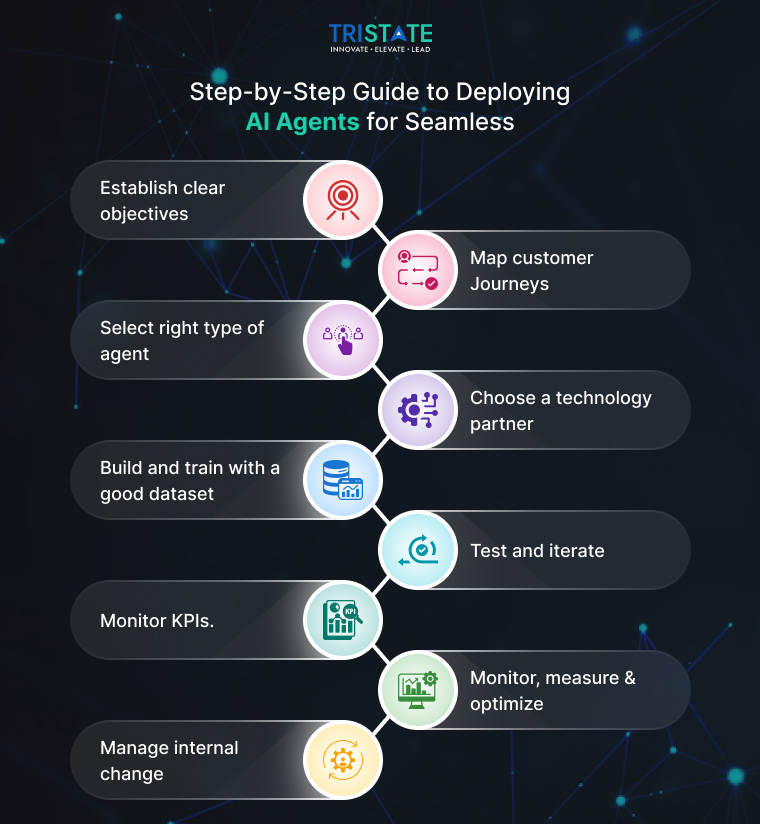
Here’s a checklist / plan you can follow.
1. Establish Clear Objectives
- What are you trying to solve? (e.g. i.e. response time reduced, CSAT improved, costs lowered)
- What metrics do you want to track? (i.e. First Contact Resolution, Average Handling Time, Customer Satisfaction)
2. Map Customer Journeys
- Look for similar queries, pain points and times of peak volume.
- Where do customers fall off? Where are the delays?
3. Select Right Type of Agent
- Start with virtual assistants / chatbots for simple queries.
- Over time, add agent-assist tools and more advanced autonomous AI agents.
4. Choose a Technology Partner
- Select an AI Development Company or NLP Development Company that have the experience.
- Make sure, they have what you need: NLP, sentiment, integrations, security.
5. Build and Train with a Good Dataset
- Train using real customer interaction logs.
- Identify intents, map workflows.
- Test edge-cases (confused inputs, jargon, multilingual, etc).
6. Test and Iterate
- Pilot the agents (maybe in lesser-risk channels).
- Get customer feedback.
- Get agent feedback.
7. Monitor KPIs.
- Implement a smooth human-AI hand-off
- Always have an option for the customer to talk to a human.
- Design the transition to be seamless (not a situation in which the customer has to repeat information).
8. Monitor, measure & optimize
- Real-time dashboards for response times, resolution rates, CSAT.
- Frequently refresher underlying models.
- Train staff to work with the agents.
- Define roles (AI does what, humans do what)
9. Manage internal change
Challenges and Points to Consider When Deploying AI Agents
AI agents are very useful, but they aren’t pixie dust. Here’s something to consider:
- Emotional Intelligence and Human Interaction:
AI can seem robotic, and customers still prefer speaking to a human when it comes to complicated or emotionally charged issues.
- Privacy and Security of Data:
Managing customer data responsibly is necessary. There are no shortcuts to trust. - Overpromising and under delivering:
If the AI gets answers wrong or routes requests incorrectly the customer will become frustrated and the AI can lose credibility. - Biases and Fairness:
Ensure that the AI engages with customers in a fair way and does not make biased decisions. Be transparent about what the AI can do and not do. - Cost and Upkeep:
Creating the AI is one thing and will have a regular effort on maintenance like update monitoring and cleaning data. - Integration Issues:
If AI agents don’t integrate smoothly with existing systems, apps and channels the approach will get messy fast.
Future of AI Agents in Customer Experience
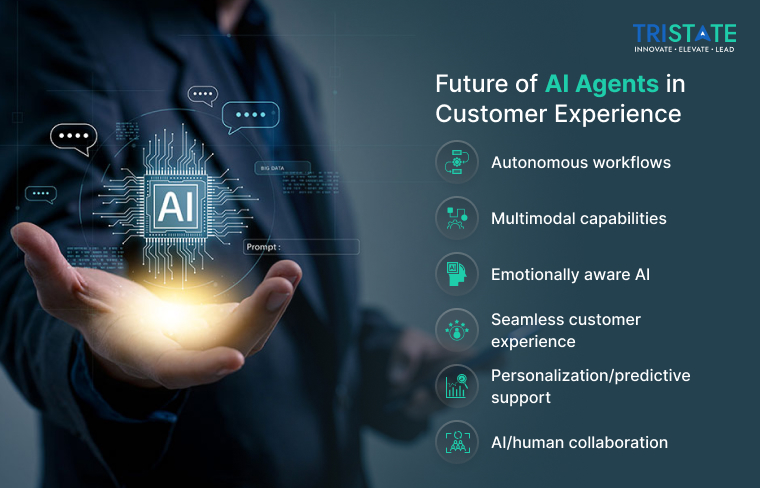
Going forward, AI agents are only getting smarter and more useful:
- Autonomous workflows: AI will not just respond to sent messages, it will take actions across systems, handling order status/deliveries/alerts automatically.
- Multimodal Capabilities: Future AI agents will integrate text/voice/images/gestures to provide a more natural interaction style.
- Emotionally Aware AI: Smarter AI agents will detect the customer tone/mood/sentiment and respond more appropriately.
- Seamless Customer Experience: AI will work quietly behind the scenes to remove potential friction points, such that customers barely notice how much work happens behind the scenes.
- Personalization/predictive Support: AI will anticipate customer issues, like delays and problems, and act before the customer has even recognized it.
- AI/human Collaboration: Humans and AI engage together, each supporting the other by doing what they do best, creating an overall smoother experience for customers.
Conclusion
The customer experience with AI agents is a competitive imperative. When executed properly, AI in customer service and customer service automation do not supplant humans, they enhance what humans are equipped to do. AI speeds up responsiveness, lowers costs, customizes experiences and allows companies to scale.
If considering an AI Development Company to build an AI Agent Development Service, or taking on a NLP Development Company engagement, begin by determining specific goals, selecting the right architecture, and keeping the customer at the forefront of everything. Do the work right. Measure the outcomes appropriately. And keep the Human experience.





